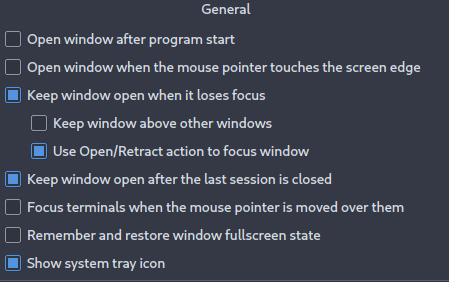Good morning everyone
I was installing Manjaro KDE yesterday, after using GNOME for a while (clean install).
What I have noticed is that every time I boot up the laptop, the drop down terminal is open. Don’t know why the behavior is like that.
I have also noticed that if I forget to close any application (file manager, thunderbird, etc) before turning the computer off or rebooting, these applications are always open on the next boot.
I do not get this behavior in GNOME or XFCE (knowing drop down terminal isn’t in GNOME).
I have been trying to find this on the internet, but I suspect that I haven’t worded my search well enough yet.
inxi
[olividir@HP ~]$ inxi -Fzzzxa -no-host
System: Host: HP Kernel: 5.8.6-1-MANJARO x86_64 bits: 64 compiler: N/A
parameters: BOOT_IMAGE=/boot/vmlinuz-5.8-x86_64
root=UUID=f90c1ec5-7cd7-47fb-bf4b-d2eb2320d764 rw quiet apparmor=1
security=apparmor udev.log_priority=3
Desktop: KDE Plasma 5.19.5 tk: Qt 5.15.0 wm: kwin_x11 dm: SDDM
Distro: Manjaro Linux
Machine: Type: Laptop System: HP product: HP Pavilion Gaming Laptop 15-cx0xxx
v: Type1ProductConfigId serial: <filter> Chassis: type: 10 serial: <filter>
Mobo: HP model: 8478 v: 70.57 serial: <filter> UEFI: Insyde v: F.22
date: 04/21/2020
Battery: ID-1: BAT1 charge: 38.0 Wh condition: 37.4/52.8 Wh (71%) volts: 12.8/11.6
model: Hewlett-Packard PABAS0241231 type: Li-ion serial: <filter> status: Unknown
CPU: Topology: Quad Core model: Intel Core i5-8300H bits: 64 type: MT MCP
arch: Kaby Lake family: 6 model-id: 9E (158) stepping: A (10) microcode: D6
L2 cache: 8192 KiB
flags: avx avx2 lm nx pae sse sse2 sse3 sse4_1 sse4_2 ssse3 vmx bogomips: 36812
Speed: 3984 MHz min/max: 800/4000 MHz Core speeds (MHz): 1: 3998 2: 3990 3: 3993
4: 3966 5: 3983 6: 3984 7: 3981 8: 3987
Vulnerabilities: Type: itlb_multihit status: KVM: VMX disabled
Type: l1tf
mitigation: PTE Inversion; VMX: conditional cache flushes, SMT vulnerable
Type: mds mitigation: Clear CPU buffers; SMT vulnerable
Type: meltdown mitigation: PTI
Type: spec_store_bypass
mitigation: Speculative Store Bypass disabled via prctl and seccomp
Type: spectre_v1
mitigation: usercopy/swapgs barriers and __user pointer sanitization
Type: spectre_v2 mitigation: Full generic retpoline, IBPB: conditional, IBRS_FW,
STIBP: conditional, RSB filling
Type: srbds mitigation: Microcode
Type: tsx_async_abort status: Not affected
Graphics: Device-1: Intel UHD Graphics 630 vendor: Hewlett-Packard driver: i915 v: kernel
bus ID: 00:02.0 chip ID: 8086:3e9b
Device-2: NVIDIA GP107M [GeForce GTX 1050 Mobile] vendor: Hewlett-Packard
driver: nvidia v: 450.66 alternate: nouveau,nvidia_drm bus ID: 01:00.0
chip ID: 10de:1c8d
Device-3: Cheng Uei Precision Industry (Foxlink) HP Wide Vision HD Integrated
Webcam
type: USB driver: uvcvideo bus ID: 1-5:5 chip ID: 05c8:03bc
Display: x11 server: X.Org 1.20.8 compositor: kwin_x11 driver: modesetting,nvidia
unloaded: intel,nouveau alternate: fbdev,nv,vesa display ID: :0 screens: 1
Screen-1: 0 s-res: 1920x1080 s-dpi: 96 s-size: 508x285mm (20.0x11.2")
s-diag: 582mm (22.9")
Monitor-1: eDP-1 res: 1920x1080 hz: 60 dpi: 142 size: 344x193mm (13.5x7.6")
diag: 394mm (15.5")
OpenGL: renderer: Mesa Intel UHD Graphics 630 (CFL GT2) v: 4.6 Mesa 20.1.7
direct render: Yes
Audio: Device-1: Intel Cannon Lake PCH cAVS vendor: Hewlett-Packard
driver: snd_hda_intel v: kernel alternate: snd_soc_skl,snd_sof_pci
bus ID: 00:1f.3 chip ID: 8086:a348
Sound Server: ALSA v: k5.8.6-1-MANJARO
Network: Device-1: Realtek RTL8822BE 802.11a/b/g/n/ac WiFi adapter vendor: Hewlett-Packard
driver: rtw_8822be v: N/A modules: rtw88_8822be port: 4000 bus ID: 02:00.0
chip ID: 10ec:b822
IF: wlo1 state: up mac: <filter>
Device-2: Realtek RTL8111/8168/8411 PCI Express Gigabit Ethernet
vendor: Hewlett-Packard driver: r8169 v: kernel port: 3000 bus ID: 05:00.0
chip ID: 10ec:8168
IF: eno1 state: down mac: <filter>
Drives: Local Storage: total: 1.60 TiB used: 396.76 GiB (24.3%)
SMART Message: Unable to run smartctl. Root privileges required.
ID-1: /dev/nvme0n1 vendor: Samsung model: MZVLW256HEHP-000H1 size: 238.47 GiB
block size: physical: 512 B logical: 512 B speed: 31.6 Gb/s lanes: 4
serial: <filter> rev: CXB73H1Q scheme: GPT
ID-2: /dev/sda type: USB vendor: Western Digital model: WD My Passport 0740
size: 465.73 GiB block size: physical: 512 B logical: 512 B serial: <filter>
rev: 1007 scheme: MBR
ID-3: /dev/sdb type: USB vendor: Toshiba model: External USB 3.0 size: 931.51 GiB
block size: physical: 512 B logical: 512 B serial: <filter> rev: 5438 scheme: MBR
Partition: ID-1: / raw size: 238.17 GiB size: 233.43 GiB (98.01%) used: 35.62 GiB (15.3%)
fs: ext4 dev: /dev/nvme0n1p2
Swap: Alert: No Swap data was found.
Unmounted: Message: No unmounted partitions found.
Sensors: System Temperatures: cpu: 58.0 C mobo: 29.8 C
Fan Speeds (RPM): N/A
Info: Processes: 301 Uptime: 1h 25m Memory: 15.53 GiB used: 4.30 GiB (27.7%)
Init: systemd v: 246 Compilers: gcc: 10.2.0 alt: 9 clang: 10.0.1 Packages: 1305
pacman: 1287 lib: 366 flatpak: 9 snap: 9 Shell: Bash v: 5.0.18
running in: konsole inxi: 3.1.05
Any idea where to start looking really appreciated.



